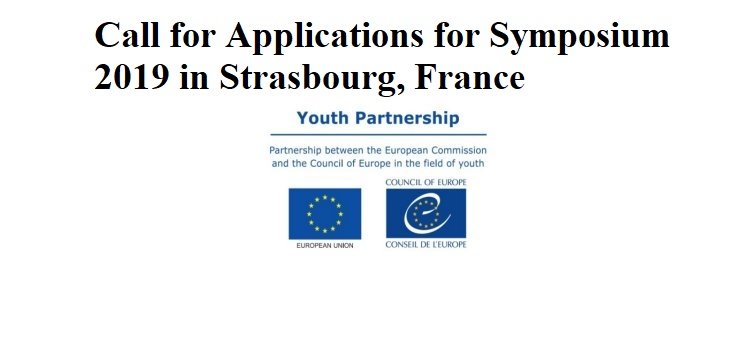
Deadline: 22 April 2019, 23.59 CET
Open to: young people, young political activists/leaders, members of political organisations and (youth wings of) political parties, representatives of civil society organisations and movements, including youth organisations, influencers and persons active in the media, young artists or activists using other public engagement forms, policy makers, youth workers, educators and teachers and researchers
Venue: 18 – 20 September 2019 in Strasbourg, France
Open to: young people, young political activists/leaders, members of political organisations and (youth wings of) political parties, representatives of civil society organisations and movements, including youth organisations, influencers and persons active in the media, young artists or activists using other public engagement forms, policy makers, youth workers, educators and teachers and researchers
Venue: 18 – 20 September 2019 in Strasbourg, France
Description
On 18-20 September 2019 the partnership between the European Commission and the Council of Europe in the field of youth will organise a symposium bringing together up to 120 participants to explore questions, tensions, challenges and opportunities regarding the political participation of young people in today’s changing world and to create a space for learning and inspiration among actors involved in this topic.
Political participation, very broadly understood as people’s activities affecting politics, the government or the state, is a crucial aspect of pluralist democracies. This includes people’s ability to express their political opinions in diverse ways and to be heard, to vote and stand in elections, to engage in civil society organisations or in thematic movements, to demonstrate or protest, to engage in issue-based activism or online activism. Forms of and attitudes to political participation change over time and it is important to understand current trends to be able to adapt support tools and help overcoming barriers to wider democratic participation, which in turn can help strengthening democratic values and attitudes in European societies. One of the challenges in understanding current developments, difficulties and opportunities in youth participation is that young people are a non-homogeneous group with diverging trends in attitudes and habits:
- While some young people are very engaged politically, others are disinterested or disillusioned and do not participate, possibly because they feel their voice is not taken into account. Is that “youth apathy” or a crisis of democracy as such? In some repressive contexts, obstacles seem to be placed in front of young people to prevent or discourage their participation.
- Among those who engage, some young people choose conventional forms of participation, such as electoral processes or civil society organisations. Other young people choose 1 unconventional forms, including artistic expression or consumer boycotts. Still others opt for illegitimate or even illegal forms of participation, such as destruction of property or violence, signalling a loss of trust in public institutions and democratic processes.
- At different levels, from the local to the European, there are different ways in which young people engage and those may vary from a context to another. Specific approaches, tools, or supports that work at one level, may not be suitable for others.
There is a need to understand better what young people see as political participation today, how they choose to engage or not to engage, and how different actors, such as organisations, movements, etc., can work with young people in appropriate ways to support their political engagement.
Eligibility
- Young people, young political activists/leaders, members of political organisations and (youth wings of) political parties, representatives of civil society organisations and movements, including youth organisations, influencers and persons active in the media, young artists or activists using other public engagement forms, policy makers, youth workers, educators and teachers and researchers are eligible to apply.
- Interested applicants should be able to work in English and reside in Europe.
Cost
Travel costs, meals and accommodation will be covered by the EU-CoE youth partnership. Specific information will be sent to successful candidates.
Application
Interested applicants are invited to fill in an online application form at the following link by 22 April 2019, 23.59 CET
In order to apply, register HERE.
If you have any questions, please write to:  youth-partnership@partnership-eu.coe.int.
youth-partnership@partnership-eu.coe.int.


